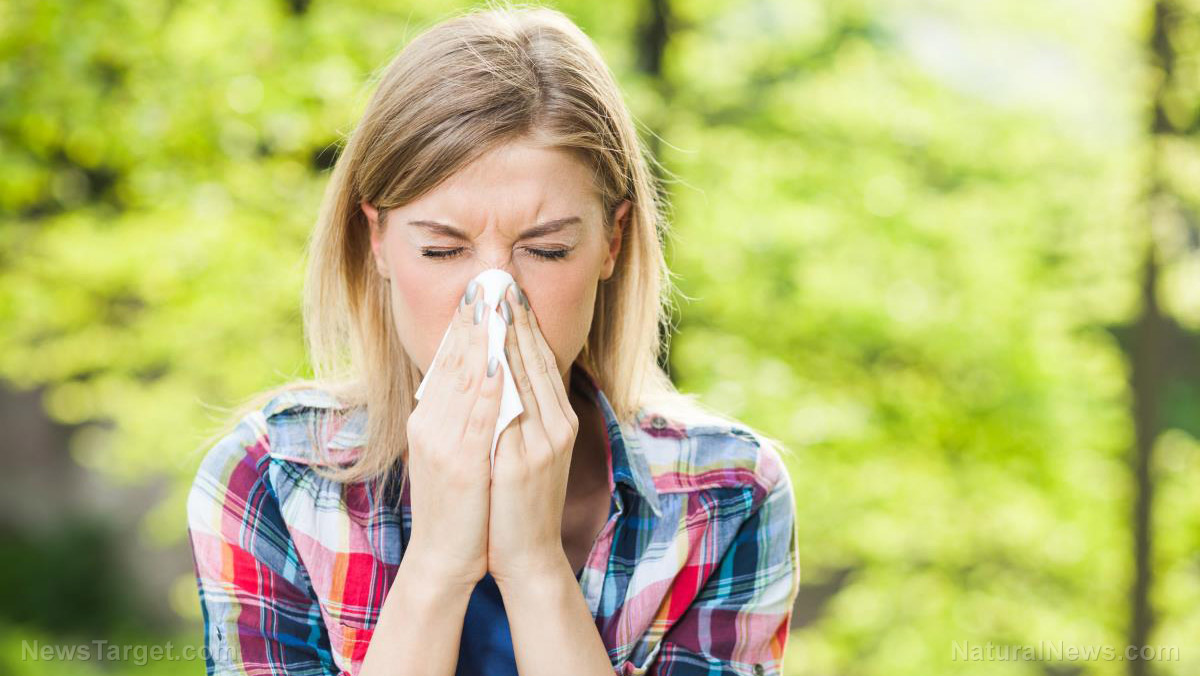6 Things you can do to protect yourself from viral infections
09/13/2023 / By Evangelyn Rodriguez

Viruses are one of the most common causes of human illness. These pathogens are responsible for the common cold and the flu, which you can catch year-round but relatively more easily during fall and winter. Because viruses can travel through the air on small particles, you can get some viral diseases by simply inhaling the air that contains these particles.
Conventional wisdom suggests that getting vaccinated can keep you protected from viral infections. But vaccines, no matter what they promise, are not the best solutions and don’t always offer adequate protection. Fortunately, there are simple, natural ways to avoid catching common viral illnesses that don’t require you to accept dubious (and often harmful) pharmaceutical concoctions into your body.
How viruses spread
Unlike bacteria and fungi, viruses are not cells. They are made of nothing but genetic material either in the form of DNA and RNA encapsulated inside a protein coat. Because they lack the machinery that would allow them to replicate all by themselves, viruses need to “hijack” living cells and “borrow” their replicative abilities in order to multiply. Viral infections usually affect the nose, throat and upper airways, if not the gastrointestinal, nervous and reproductive systems.
The replication cycle of the influenza virus, which causes the flu, is said to be very fast. Infected cells can shed copies of the virus within six hours from the time of infection. Colds, on the other hand, are caused by many different viruses, specifically rhinoviruses, adenoviruses, coronavirus and human metapneumoviruses. Rhinoviruses, which are responsible for most colds, take eight to 12 hours to complete their replication cycle. Cold symptoms usually manifest one to three days after infection.
Viruses can spread and enter your body through various ways. Some of the most common transmission routes include:
- Inhalation of droplets and particles that are breathed or coughed out by an infected person. Viruses could also enter your body through your eyes or mouth.
- Touching your eyes, nose or mouth after coming in contact with/touching surfaces or objects that have the virus on them.
- Being bitten by an infected insect or animal.
- Sharing food with an infected person or drinking contaminated water.
- Having sex with someone who has the infection.
- Through maternal transfer during pregnancy.
Although your body is equipped to mount a defense against viruses, certain factors, such as cold weather, could allow viruses to circulate and take hold more easily. According to studies, cold temperatures can significantly weaken your nasal cell defenses, making you more prone to catching a cold. This is why taking preventive measures and adopting healthy habits are your best options for avoiding viral illnesses during the cold season.
The deal with annual flu shots
While there are no vaccines for the common cold, flu shots are actively promoted by the government and health agencies as the “best protection” against seasonal illness. However, flu vaccines are not 100 percent safe and many Americans sustain injuries after receiving their vaccinations.
While not publicly advertised, it is a fact that viral strains used to make flu shots differ each year. Because different viruses (i.e., influenza A, B and C) can cause the flu in humans, scientists from the Centers for Disease Control and Prevention (CDC) and the Food and Drug Administration make annual determinations as to which strain/s will become prevalent the following year. Vaccine manufacturers depend on these “educated guesses” for their flu shot formulations.
As a consequence, the effectiveness of flu vaccines varies each year, and people who may not have experienced an adverse reaction previously could suffer from one the following year due to the adjustments made to the vaccine’s ingredients. Some people only experience mild side effects, such as cough, fever, headaches, muscle aches, runny nose, sore throat, vomiting or wheezing. But there are others who report severe side effects. (Related: VACCINES COST LIVES: Child mortality is HIGHER in developed nations that require more vaccines – new study.)
Guillain-Barre Syndrome (GBS), a disorder in which the immune system mistakenly attacks peripheral nerves, is one of the most commonly reported serious injuries in relation to annual flu vaccines. Pain that persists for more than a couple of days after flu vaccination could also be a sign of other severe vaccine injuries, such as anaphylaxis, chronic inflammatory demyelinating polyneuropathy (CIDP), Parsonage-Turner Syndrome (brachial neuritis) and shoulder injury related to vaccine administration (SIRVA).
6 Tips to avoid viral infections
The unreliability of vaccines and the risks associated with them make them too dangerous to be taken routinely as the government suggests. While the tips and healthy habits listed below don’t guarantee you will avoid illness, they can nevertheless lower your likelihood of catching viral illnesses without endangering your health. (Related: Doctors share their most effective strategies for treating “seasonal” illnesses.)
Here are six things that you can do to avoid catching a virus: (h/t to SportsInjuryClinic.net)
Practice proper hand hygiene
Washing your hands regularly with soap and water is one of the best ways to protect yourself against viral infections, according to the CDC. By making a habit of handwashing, you can stop the spread of germs and prevent transmitting the virus to yourself after touching a contaminated surface or object or being in close contact with an infected person.
Wash your hands thoroughly before touching your face or immediately after touching something that people frequently touch or use. Make sure you carry a hand sanitizer with you at all times so you can still sanitize your hands even if there is no water or soap available.
Wear warm clothing
Fluctuations in your body temperature have a negative impact on your immune response. According to a study published in the Journal of Allergy and Clinical Immunology, even a 5 C drop in temperature can affect how your cells respond to the presence of viruses.
To keep your immune system working efficiently, wear warm clothing and plenty of layers when the weather is cold. Remove wet clothing immediately and change to dry ones to stay warm and keep your immune system functioning optimally.
Follow a healthy diet
A well-balanced diet is important because it provides your body with all the nutrients it needs. These include nutrients like vitamins A, C and D, and minerals like copper, zinc, magnesium and selenium, which all help strengthen your immune system. Being deficient in these nutrients spells trouble not only for your immune system but also for your overall health.
Research has also found that an unhealthy diet high in refined carbohydrates, added sugar and additives could suppress immune function, so make sure you eat plenty of nutritious fruits and vegetables and avoid highly processed foods to keep your immune system in tip-top shape.
Avoid being coughed or sneezed on
A cough is a symptom of both the common cold and the flu, so stay away from people who cough incessantly, especially if they don’t cover their mouths while coughing. Remember that viruses can enter your body if you inhale air carrying droplets or particles with these pathogens. Similarly, stay away from people who sneeze, especially if they have stuffy or runny noses.
Avoid drinking alcohol
Heavy and even moderate consumption of alcohol can weaken your body’s ability to defend against threats. Studies show that alcohol, especially at high concentrations, can reduce your immune cells’ ability to produce inflammatory signals (cytokines), which are important for fighting viral infections.
Research has also found that alcohol abuse can significantly reduce your B cell and T cell counts. B cells are the immune cells that produce antibodies, while T cells help direct your immune response by helping B cells get rid of pathogens.
Get enough sleep
Sleep provides invaluable support to your immune system. Inadequate sleep not only decreases your immune cells’ production of protective cytokines, but according to studies, sleep deprivation also lowers your antibody production and immune cell count. To maintain a strong and healthy immune system, make sure you get seven or eight hours of good-quality sleep each night.
Aside from these healthy habits, there are plenty of foods and nutrients that can boost your immunity and help keep viral infections at bay. Learn all about them at Antiviral.news.
Watch this video to learn about foods and nutrients that can help boost your immunity against viral infections.
This video is from the Holistic Herbalist channel on Brighteon.com.
More related studies:
Common cold can help boost immunity against COVID, researchers say.
Natural healing: 12 Cold and flu home remedies.
Got the sniffles? Avoid these 4 foods if you want to recover from a cold or flu faster.
12 Medicinal herbs and spices that can boost the immune system.
Sources include:
Submit a correction >>
Tagged Under:
alternative medicine, common cold, Flu, Flu shots, health science, immune system, infections, influenza, natural health, natural medicine, prevention, tips, vaccine damage, vaccine injury, vaccines, Viruses
This article may contain statements that reflect the opinion of the author
RECENT NEWS & ARTICLES
COPYRIGHT © 2017 VACCINE INJURY NEWS COM




















